
Why Is Folate So Important?
Folate is a form of vitamin B9 that is naturally found in various foods such as dark green leafy vegetables, eggs, beans and citrus fruits.
Folate is essential for many bodily processes:
- Making RNA, DNA and proteins.
- Cell growth, such as red blood cells.
- In the brain, folate is vital for constructing myelin and making chemical messengers (neurotransmitters such as serotonin, dopamine and noradrenaline) that transmit signals in the brain.
- In a pregnant woman, folate is essential in early pregnancy to reduce the risk of congenital disabilities in the brain and spine.
What is the Daily Recommended Amount of Folate?
Most people that eat a healthy diet are able to get enough folate from their diet. The following are daily recommended amounts of folate (National Institutes of Health).
|
Age |
Recommended amount of dietary folate equivalents (DFE) |
|
1-3 years |
150 mcg DFE |
|
4-8 years |
200 mcg DFE |
|
9-13 years |
300 mcg DFE |
|
14-18 years |
400 mcg DFE |
|
19+ years |
400 mcg DFE |
|
Females aged 19+ years planning a pregnancy |
600 mcg DFE |
* DFE is dietary folate equivalents. For more information, visit https://ods.od.nih.gov/factsheets/Folate-HealthProfessional/
Note that even if one is getting enough folate, there may still be other reasons why they are not able to get enough folate into their brain.
What are the Signs and Symptoms of Low Folate?
Signs of Low Folate
Classic signs of low folate include the following;
- General weakness and fatigue;
- Cardiovascular: Irregular heartbeat; shortness of breath;
- Megaloblastic anemia, a condition where the lack of folate results in fewer red blood cells, and they appear larger (‘megaloblastic’) than normal;
- Skin/hair: Hair loss; pale skin; mouth sores.
Signs of Low Folate in the Brain
In young children, low folate may show up as the following (Ramaekers, 2016):
|
Syndrome where a child has normal development in the first year, but at about two years of age, they lose mental and motor skills. |
|
When people have low folate in the brain (cerebral folate deficiency), about 44% have ASD (Rossignol, 2021). People with ASD have FRAAS (FRA auto-antibody syndrome) much more frequently than other people -- when people have ASD, their chance of having FRAA is 19X more likely than typically developing children without an ASD sibling (Rossignol, 2021). |
|
Seizure disorders. Spastic-ataxic syndrome (i.e. problems with balance and coordination). |
In adolescents and adults, low folate may show up as the following (Ramaekers, 2016):
|
Depression that has not responded to antidepressant medication (such as SSRIs) may suggest low folate. When people have low folate, they have a) lower levels of tetrahydrobiopterin (BH4) which leads to lower levels of serotonin and dopamine, and b) higher levels of homocysteine, which is linked to conditions such as depression, Alzheimer's and heart disease. |
|
Research suggests that at least some cases of psychosis may be due to problems with low folate in the brain (Roffman, 2017). |
Other problems may include:
- Attention deficit hyperactivity disorder (ADHD)
The Folate Pathway
There are many steps along the way, from eating folate, changing it to a form that the body can use, and then finally getting it into the brain.
|
Folate
|
Folate is normally present in various foods. |
X Problems can occur when people do not get enough folate in their diet, have troubles absorbing folate, or perhaps have extremely high need (e.g. pregnant women). In cases such as this, consider
|
|
 Dihydrofolic reductase (DHFR) enzyme |
X Problems can occur if people are taking medications such as methotrexate can inhibit DHFR. In cases such as this, consider
|
|
| Tetrahydrofolate (THF) | ||
 |
||
|
5-Methyltetrahydrofolate (5,10-MTHF) |
|
|

MTHFR enzyme |
X Problems can occur because some people have MTHFR gene variants that lead to lower enzyme activity, e.g. C677T variant (which can be shown by pharmacogenomic testing).
|
|
|
L-methylfolate |
||
|

|
||
|
Transported into the brain, i.e. crosses the blood brain barrier.  |
Cerebral folate receptor alpha (FRα) transports 5-methyltetrahydrofolate (5-MTHF) into the brain. |
X Problems can occur when people have folate receptor alpha autoantibodies (FRAAS), which block 5-MTHF from getting into the brain. It is believed that drinking cow's milk can trigger FRAAS. In cases such as this, consider
|
Investigations and Tests for Low Folate
Your health care provider might suggest tests to see if you might have low folate.
Folate test
- The classic folate test measures how much folate is in the blood, however is not actually a good indicator of whether or not that folate is getting into and being used by the brain. While we can look at red blood cell samples, we cannot at this point look at people's brain cells to see how much folate is in their brain...
Homocysteine
- When folate levels are low, this can result in elevated levels of homocysteine in the blood aka hyperhomocysteinemia (HHCy).
Pharmacogenetic testing
- Pharmacogenetic testing looks at your genes to see if you have differences that might affect what medications might be more or less helpful for you.
- Pharmacogenetic testing can see if there are problems with methylenetetrahydrofolate reductase (MTHFR), the enzyme responsible for converting folic acid to methylfolate, which might suggest more chance of benefit from taking methylfolate.
- Where to find Pharmacogenomic testing in Ontario
- Gamma Dynacare
- “Genecept” test
- Does include MTHFR testing.
- Cost $495 CDN
- https://www.dynacare.ca/what-s-next/genetics/pharmacogenetics.aspx
- Inagene
- “Personalized Insights ™ for Pain and Mental Health”
- Does include MTHFR testing
- Cost $299 CDN
- https://inagene.com/collections/shop-page
- Gamma Dynacare
Treating Low Folate: Get Enough Folate In Your Diet
Get enough folate in your diet by eating foods such as:
-
Vegetarian sources
- Dark green leafy vegetables (turnip greens, beets and beet greens, spinach, romaine lettuce, asparagus, Brussels sprouts, broccoli)
- Beans (e.g. lentils)
- Peanuts
- Sunflower seeds
- Fresh fruits and citrus fruits (e.g. oranges, lemons, grapefruit, lime)
- Whole grains
- Eggs
-
Non-vegetarian sources
- Liver
- Seafood
- Fortified foods and supplements.
Treating Low Folate with Folate Derivatives
For many people, even if you eat enough foods with folate, or take folate supplements, it is not enough as there may be issues with their folate pathways.
Are there problems with metabolising folate to a useful form due to MTHFR gene problems?
- If so, then L-methylfolate might be helpful (Lam, 2022).
Are there problems with the folate alpha receptor and thus problems transporting folate into the brain?
- If so, then folinic acid (Leucovorin) might helpful ((Frye, 2016) .
Speak with your health care provider to see if folate supplementation might be helpful, and if so, what type might be most helpful in your situation. And not that it is not a cure-all or panacea.
Treating Low Folate: Folinic Acid
There is some evidence that folinic acid may be useful in cerebral folate deficiency syndrome (such as early onset autism, especially with seizures and coordination issues).
For more information about treatment with folinic acid.
Treating Low Folate: L-Methylfolate
Dosage
- For children (up to aged 12), official dosages have not yet been established.
- For adolescents and adults (aged 12+), studies generally use 7.5-15 mg daily.
- Your health provider will let you know more precisely how it is dosed depending on your specific situation.
Other considerations
- Try to stop dairy products during the L-methylfolate trial.
- In some people, it appears that drinking milk causes folate receptor autoantibodies, which prevents folate from being transported into the brain (Raemakers, 2008). As a result, some experts recommend going dairy-free while trying methylfolate.
- Take Vitamin B12 1,000 mcg daily.
- Some people report that after starting l-methylfolate, they feel better but then feel worse. One theory on why they feel worse is that there may be low Vitamin B12. Taking Vitamin B12 supplements is thus recommend by some healthcare providers (such as naturopaths) to avoid this situation.
- Some people report that after starting l-methylfolate, they feel better but then feel worse. One theory on why they feel worse is that there may be low Vitamin B12. Taking Vitamin B12 supplements is thus recommend by some healthcare providers (such as naturopaths) to avoid this situation.
Do this for 3-months -- after that, see if there is improvement.
- If there is improvement, then continue taking l-methylfolate.
- If there is no improvement, then stop taking l-methylfolate.
Side Effects of L-Methylfolate
On the one hand, the actual manufacturer for Deplin (the brandname of l-methylfolate which is approved by the FDA in the USA) reports no actual side effects from Deplin in the product monograph, other than allergic reactions which is more due to the compontents of Deplin, as the pill contains dairy and soy.
Where to Find L-Methylfolate in Canada?
Although folate is easy to find at pharmacies in Canada, it is harder to find L-methylfolate. For this reason, we are providing some examples of online retailers where one can find L-methylfolate. (Normally we do not provide information about specific brands, or retailers on eMentalHealth.ca.) Note that the presence or lack of presence of a brand does not imply endorsement or non-endorsement.
Looking for L-Methylfolate 7.5-15 mg dosages?
| Vitamatic Methyl Folate 15 mg x 120 capsules $24.99 CDN for 120 capsules = $0.20 per capsules (15 mg capsule) = $6 CDN / month https://www.amazon.com/Vitamat... | 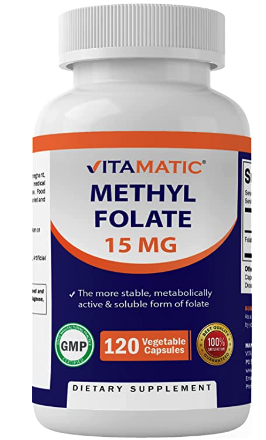 |
FolateMaxx L-methylfolate 15 mg capsules $60 CDN for 90 capsules = $0.67 per capsule (15 mg capsule) = $20 CDN / month https://www.amazon.com/FolateMaxx-L-Methylfolate-Capsules-Professional-Quality/dp/B07P9KQMXW/ | 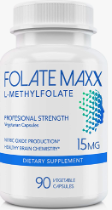 |
Our Daily Vites L-methylfolate 15 mg capsules $60 CDN for 60 capsules = $1 per capsule (15 mg capsule) = $30 CDN/month (at 15 mg daily) https://www.amazon.ca/Our-Daily-Vites-L-Methylfolate-Cofactors/dp/B083WQQSK8/ | 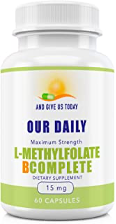 |
Metabolic Maintenance, L-methylfolate 10 mg capsules $71 CDN for 90 capsules = $24 CDN / month (at 10 mg daily) https://ca.iherb.com/pr/metabolic-maintenance-l-methylfolate-10-mg-90-capsules/38360 | 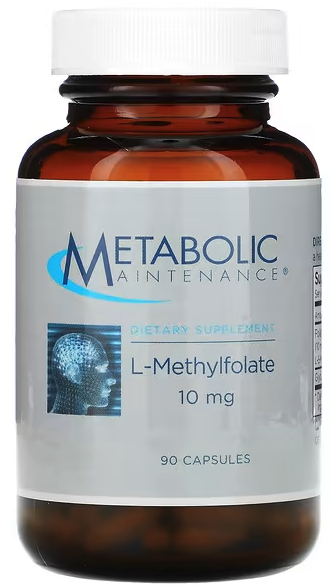 |
| NOW Foods, Methyl Folate, 5 mg, 50 Veg Capsules $30 CDN for 50 veg capsules = $36 CDN/month for 10 mg daily = $54 CDN /month for 15 mg daily https://ca.iherb.com/pr/now-fo... | 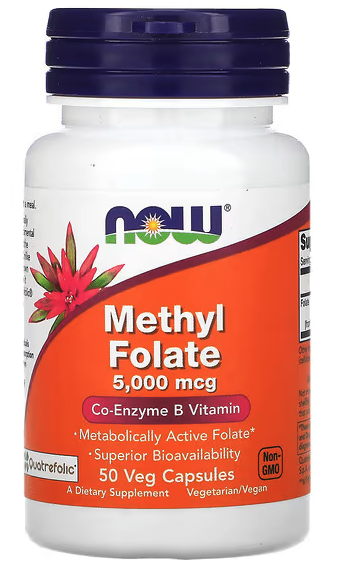 |
Looking for L-methylfolate 1-3 mg daily amounts?
Intelligent Labs L-5 MTHF 1 mg $25 for 120 capsules = $0.21 per 1 capsule (1 mg) = $6.30 CDN/ month = $0.42 per 2 capsules (2 mg) = $12 CDN / month = $0.63 per 3 capsules (3 mg) = $19 CDN /month | 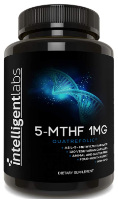 |
NOW Methylfolate 1000 mcg (= 1 mg) $21 for 90 tablets = $0.23 per 1 tablet (1 mg) = $7 CDN/ month = $0.46 per 2 tablets (2 mg) = $14 CDN / month = $0.66 per 3 tablets (3 mg) = $20 CDN / month https://www.amazon.ca/Now-Methyl-Folate-1000mcg-Tablets/dp/B07HPS1ZHP/ | 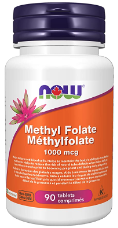 |
Natural Factors BioCoenzymated methylfolate + B12
= $0.33 per 1 capsule (1 mg) = $10 CDN / month = $0.66 per 2 capsules (2 mg) = $20 CDN / month = $0.99 per 3 capsules (3 mg ) = $30 CDN/month https://kardish.com/products/natural-factors-biocoenymated-methylfolate-b12 | 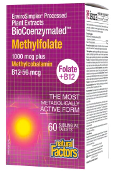 |
Douglas Laboratories Methylfolate L-5-MTHF 1,000 mcg (= 1 mg)
= $0.50 / 1 tablet (1 mg) = $15 CDN / month = $1.00 / 2 tablets (2 mg) = $30 CDN / month = $1.50 / 3 tablets (3 mg) = $45 CDN / month https://www.amazon.ca/Douglas-Laboratories-Metafolin-Formation-Deficiency/dp/B088P8RCLJ/ | 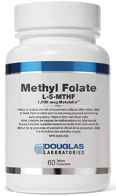 |
* Price data from Amazon.ca retrieved June 30, 2022.
References
Bender A, Hagan K, Kingston N: The association of folate and depression: A meta-analysis. J. Psychiatr Res 95 (2017): 9-18. https://doi.org/10.1016/j.jpsychires.2017.07.019
Bobrowski-Khoury N, Ramaekers VT, Sequeira JM, Quadros EV. Folate Receptor Alpha Autoantibodies in Autism Spectrum Disorders: Diagnosis, Treatment and Prevention. Journal of Personalized Medicine. 2021; 11(8):710. https://doi.org/10.3390/jpm110...
Frye RE, Slattery J, Delhey L, Furgerson B, Strickland T, Tippett M, Sailey A, Wynne R, Rose S, Melnyk S, Jill James S, Sequeira JM, Quadros EV. Folinic acid improves verbal communication in children with autism and language impairment: a randomized double-blind placebo-controlled trial. Mol Psychiatry. 2018 Feb;23(2):247-256. doi: 10.1038/mp.2016.168. Epub 2016 Oct 18. PMID: 27752075; PMCID: PMC5794882.
Lam, Nelson Siu Kei, et al. "The potential use of folate and its derivatives in treating psychiatric disorders: A systematic review." Biomedicine & Pharmacotherapy 146 (2022): 112541.
https://doi.org/10.1016/j.biop...
National Institute of Health (NIH), published Mar 29, 2021. Retrieved May 27, 2022 from https://ods.od.nih.gov/factsheets/Folate-HealthProfessional/
Ramaekers VT, Sequeira JM, Blau N, Quadros EV. A milk-free diet downregulates folate receptor autoimmunity in cerebral folate deficiency syndrome. Dev Med Child Neurol. 2008 May;50(5):346-52. doi: 10.1111/j.1469-8749.2008.02053.x. Epub 2008 Mar 19. PMID: 18355335; PMCID: PMC2715943.
Ramaekers VT, Sequeira JM, Quadros EV. The basis for folinic acid treatment in neuro-psychiatric disorders. Biochimie. 2016 Jul;126:79-90. doi: 10.1016/j.biochi.2016.04.005. Epub 2016 Apr 8. PMID: 27068282.
https://pubmed.ncbi.nlm.nih.gov/27068282/
Roffman, J., Petruzzi, L., Tanner, A. et al. Biochemical, physiological and clinical effects of L-methylfolate in schizophrenia: a randomized controlled trial. Mol Psychiatry 23, 316–322 (2018). https://doi.org/10.1038/mp.2017.41
Shelton RC, Sloan Manning J, Barrentine LW, Tipa EV. Assessing Effects of L-methylfolate in Depression Management: Results of a Real-World Patient Experience Trial. Prim Care Companion CNS Disord. 2013;15(4):PCC.13m01520. doi: 10.4088/PCC.13m01520. Epub 2013 Aug 29. PMID: 24392264; PMCID: PMC3869616.
https://www.ncbi.nlm.nih.gov/pmc/articles/PMC3869616/
Authors
Written by the health professionals at CHEO and the Department of Psychiatry, at uOttawa.
Disclaimer
Information in this pamphlet is offered ‘as is' and is meant only to provide general information that supplements but do not replace your health provider's information. Always contact a qualified health professional for further information in your specific situation or circumstance.
Creative Commons License
You are free to copy and distribute this material in its entirety as long as 1) this material is not used in any way that suggests we endorse you or your use of the material, 2) this material is not used for commercial purposes (non-commercial), 3) this material is not altered in any way (no derivative works). View full license at http://creativecommons.org/licenses/




